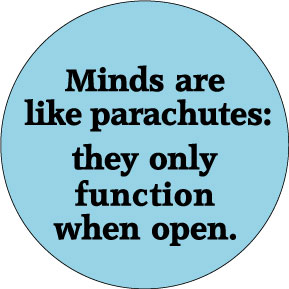
I’ve always liked the old proverb, “If you don’t know where you’re going, any road will take you there.” And I always follow it up with something like, “So you’d better be ready for whatever might be down that road.”
People often tell me how difficult it is for them to make up their minds. Of course, major decisions such as moving, a job change or getting married require (and deserve) extensive thought. The long-term consequences will have to be enjoyed – or endured) – for the rest of your life. So if you DO know where you’re going, your choice of road(s) will be a lot easier.
Many people experience indecision (or careless decision-making) over less important things. Should I buy a new car or used? Where should I go on vacation? When people tell me that they have trouble deciding, I suggest that they pretend that they’ve already made the decision, and then try to visualize the events that might come to pass as a result. I’ve written many times about introspection, and this is a good illustration of that. For example, “If I buy a used car, I could end up with big repair bills down the line. But if I buy a new one, the payments might be too high.” Or, “I’d love to go to San Diego on vacation, but I hate flying. If I vacation locally, I can drive, but I might not have as much fun.” What to do?
Some indecision can result from irrational perfectionism. The irrational perfectionist feels that it’s a disaster to make a mistake. But mistakes are not disasters. Only disasters are disasters — and mistakes are much more frequent. The irony of perfectionism is in its good intentions. A person wants to do things right, even perfectly, and that is certainly a good motive. But if the motive is so overpowering that one becomes paralyzed, then whatever is achieved will not be perfection.
Another reason for indecision is multiple choices. For example, I was fortunate to have a number of excellent schools and cities from which to choose for my postgraduate degree. I had trouble deciding until it dawned on me, “I have five equally good choices. No matter which one I choose, I know I’m going to be happy.” That realization liberated me from the pressure to make the “perfect” choice. I was able to make my decision based on objective facts rather than emotion.
When people are indecisive they often assume that there is only one right choice. But many life decisions are not that way. Having several good things to choose from is a fine thing! Some people know what they want, but they fear their choice might be met with disapproval. This isn’t indecision, though it might feel like it. It’s just a reluctance to take personal responsibility.
The author of the website charminghealth.com puts it nicely: “When there are really tough choices, … many people can never make up their minds, and tend to keep that issue lingering. Prolonged indecision or indecisiveness may be due to an extreme fear of risk and responsibility. When we accept the challenge, whatever we do is bound to involve risk, rigor and responsibility. If we run away … we may lose the opportunity for growth.”
Growing up biologically is pretty much complete after about 18 years or so. Growing up emotionally is less predictable and takes ongoing mental initiative. It’s more than just skill: It’s surrender to the fact that decisions are inescapable. You can’t NOT make decisions. No matter what, choices will present themselves, and you’ll have no choice but to decide — ready or not. The bleak alternative is that you can decide to let others do your choosing for you. But even then, deciding to not make decisions is, in fact, a decision.
Make your choices work for you. Liberate yourself from the opinions and whims of others by challenging the mistakes in thinking that can make decisions so difficult.
Follow Dr. Hurd on Facebook. Search under “Michael Hurd” (Charleston SC). Get up-to-the-minute postings, recommended articles and links, and engage in back-and-forth discussion with Dr. Hurd on topics of interest. Also follow Dr. Hurd on Twitter at @MichaelJHurd1, drmichaelhurd on Instagram, Michael Hurd Ph.D. on LinkedIn, @DrHurd on TruthSocial
